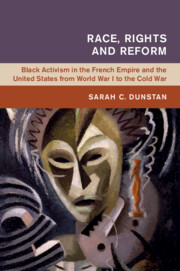 Race, Rights and Reform
Race, Rights and Reform Book contents
- Race, Rights and Reform
- Global and International History
- Race, Rights and Reform
- Copyright page
- Contents
- Acknowledgments
- Notes on Terminology and Language
- Introduction
- 1 Black Is a Country, n’est-ce pas? Race, Rights and Nation in the Wilsonian Moment
- 2 Anti-imperial Comrades: Black Radicalism and the Communist Possibility
- 3 La vogue nègre: Racial Renaissance at the Intersection of Republic, Empire and Democracy
- 4 Civilization’s Gone to Hell? Revolutionary Poetry, Humanism and the Crisis of Sovereignty
- 5 Give Me Liberty! Black Intellectual Struggles against Fascism in the Fight for Democracy
- 6 “A New Fascism, the American Brand”: Anti-communism, Anti-imperialism and the Struggle for the West
- 7 “The Sword of Damocles”: Présence Africaine and Decolonization in the Face of the Cold War
- Epilogue
- Bibliography
- Index
2 - Anti-imperial Comrades: Black Radicalism and the Communist Possibility
Published online by Cambridge University Press: 01 March 2021
- Race, Rights and Reform
- Global and International History
- Race, Rights and Reform
- Copyright page
- Contents
- Acknowledgments
- Notes on Terminology and Language
- Introduction
- 1 Black Is a Country, n’est-ce pas? Race, Rights and Nation in the Wilsonian Moment
- 2 Anti-imperial Comrades: Black Radicalism and the Communist Possibility
- 3 La vogue nègre: Racial Renaissance at the Intersection of Republic, Empire and Democracy
- 4 Civilization’s Gone to Hell? Revolutionary Poetry, Humanism and the Crisis of Sovereignty
- 5 Give Me Liberty! Black Intellectual Struggles against Fascism in the Fight for Democracy
- 6 “A New Fascism, the American Brand”: Anti-communism, Anti-imperialism and the Struggle for the West
- 7 “The Sword of Damocles”: Présence Africaine and Decolonization in the Face of the Cold War
- Epilogue
- Bibliography
- Index
Summary
This chapter focuses on the critical moments in which institutional Communism as well as Marxist thinking brought activists and thinkers from the French Empire and the United States into contact as they fought to gain rights within their respective national contexts. Disenchanted with the promises of Wilsonian self-determination and the gap between the promise and reality of Republican democracy, many black activists theorized their oppression in Marxist terms, expanding that political theory to incorporate race. Moreover, at various moments the Communist International (Comintern) and the national Communist Parties such as the Parti Communiste Français and the Communist Party of the United States of America offered financial, institutional and rhetorical support that brought black activists together. It brings together Comintern documents from the Russian State Archives of Sociopolitical History into dialogue with both French and American communist and anti-imperial publications such as Le Paria, Crusader, Le Cri des négres, and the Negro World as well as the police surveillance records such as those from the Paris Police Prefecture and the Military Intelligence Records at the National Archives in Washington, DC.
- Type
- Chapter
- Information
- Race, Rights and ReformBlack Activism in the French Empire and the United States from World War I to the Cold War, pp. 48 - 85Publisher: Cambridge University PressPrint publication year: 2021


